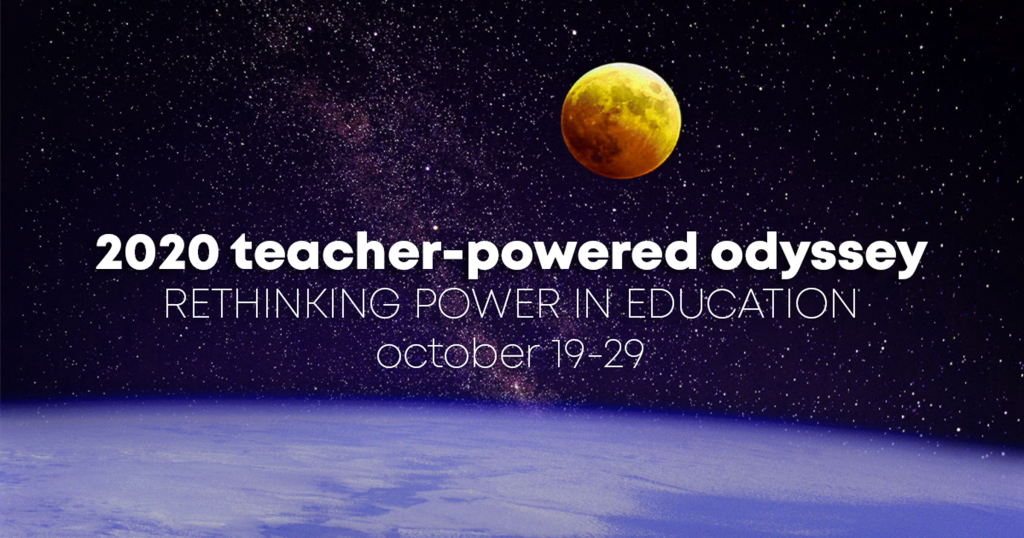“Who is at the table with me making decisions, designing our school programs or new schools, or even a first project for a beginning independent learner?” Tony Simmons asked those gathered at an event for educator teams designing and leading schools. Then he challenged: “Who isn’t at that table?”
From October 19 to 29, more than 600 attendees participated in the first ever virtual conference on teacher-powered schools, 2020 Teacher-Powered Odyssey: Rethinking Power in Education. The gathering—restructured from an in-person format in the wake of Covid-19—built upon community cultivated at previous conferences in Minneapolis, Los Angeles, and Boston.
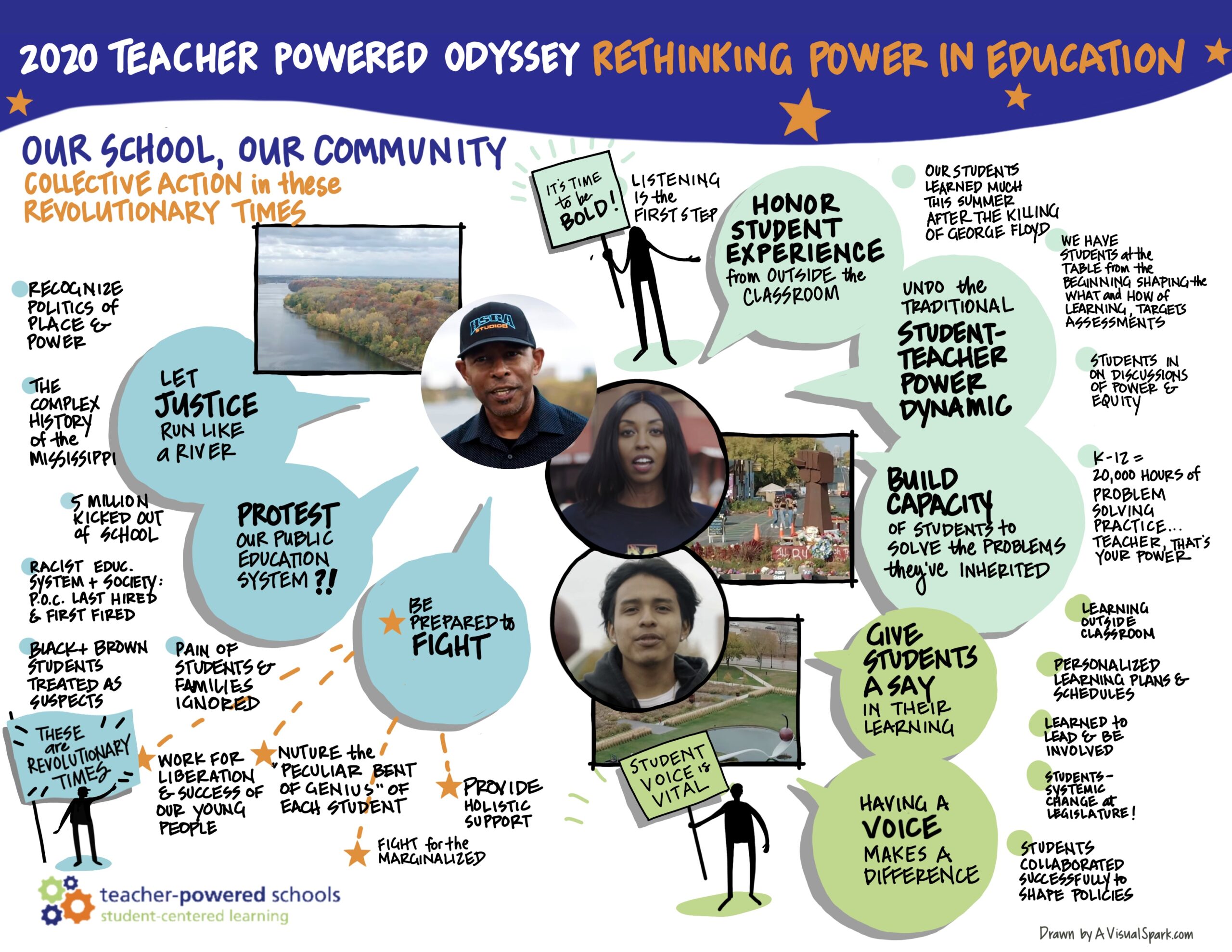
Simmons, co-founder and executive director at Saint Paul’s High School for Recording Arts (HSRA), delivered one-third of the opening keynote, sharing space with teacher-advisor Haben Ghebregergish and student Walter Cortina, also both of HSRA.
Their joint address drove home the conference theme of rethinking power in education, chosen last year but made all the more prescient in 2020 after police violence against Black lives compelled a national conversation on who holds power in our institutions and a global pandemic forced a reimagining of teaching and learning.
“In order for education to be relevant to students, students should be at the table from the beginning,” Ghebregergish insisted, describing how HSRA students help shape learning targets and chart their own path for success. Elevating student voice and choice stands out as a key practice for the teacher-powered public charter school. “This way completely undoes the traditional student-teacher power dynamic.”
“The school has a very unique set up and it really helps students like me who don’t really fit well with the traditional school system,” Cortina shared. “[HSRA understands] having a voice really matters and any chance a young person can have one, we should push them towards it.”
What we heard: Student power and trusting relationships are key
As conference-goers grappled with the question of who holds—and who should hold—power in our education system, a few common answers emerged: First, if they don’t already, students should share power. Second, strong relationships are critical to teacher-powered success. These ideas are part and parcel of teacher-powered schools, and were underscored in breakout sessions throughout the conference.
Teachers made clear that the greater autonomy and authority they enjoyed, the more they were able to share that power with students.
Teacher-powered schools move decision-making to those closest to the students—teachers. In breakout sessions, teachers made clear that the greater autonomy and authority they enjoyed, the more they were able to share that power with students and improve the learning program.
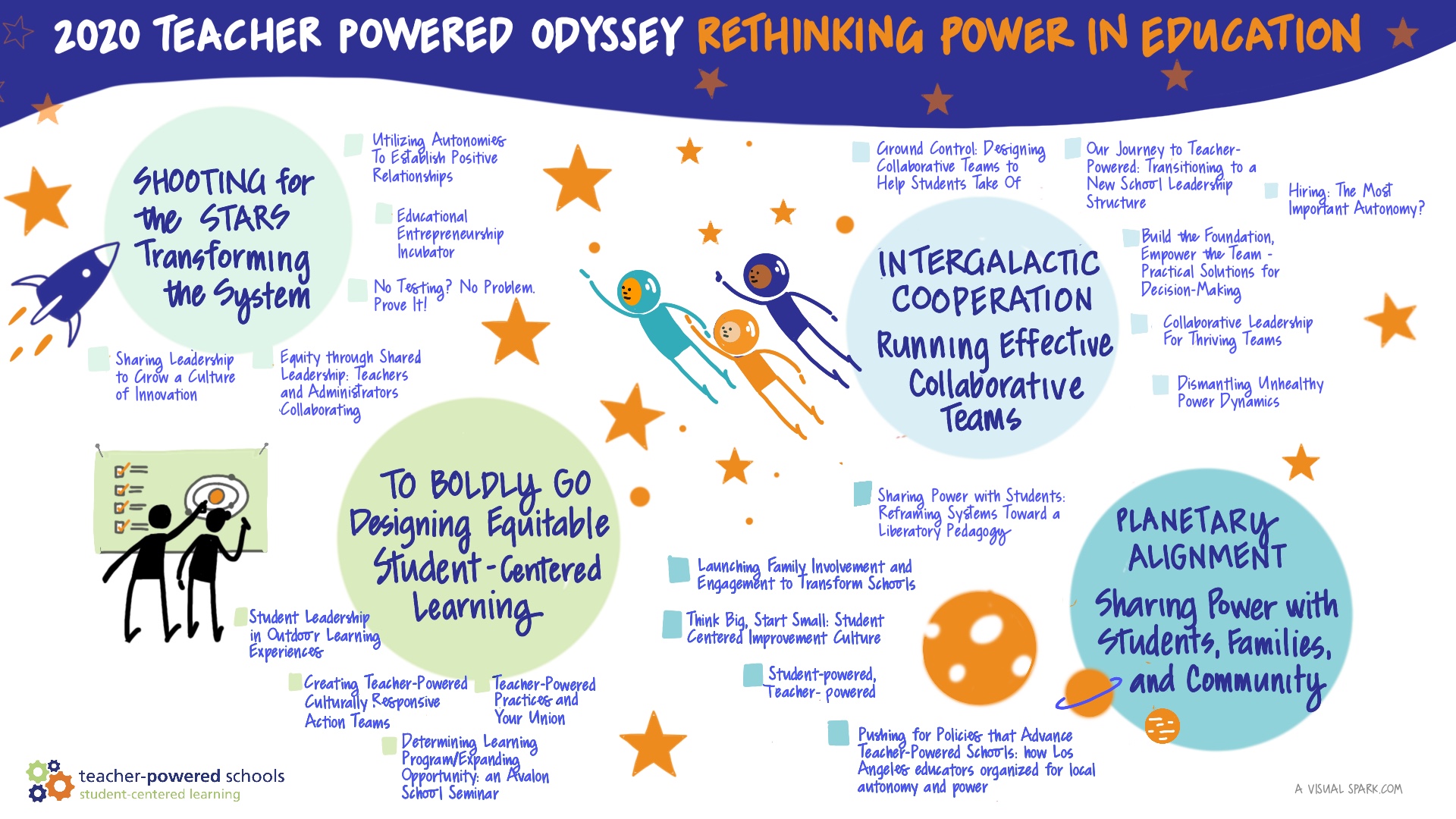
Breakouts focused on developing and maintaining trusting relationships among teacher teams, in sessions like: Utilizing autonomies to establish positive relationships, Creating teacher-powered culturally responsive action teams, Sharing leadership to grow a culture of innovation, and Sharing power with students: Reframing systems toward a liberatory pedagogy.
“It’s refreshing to know that collaborative leadership looks similar across the country and that we also face similar challenges,” shared one attendee. “These types of conversations allow us to make such connections, share resources, and share solutions.”
Going virtual: An opportunity to “go” new places
The switch to a virtual conference format allowed easier access for a national audience, especially teachers with limited professional development dollars. Conference-goers from 21 states and three countries composed more than 100 teacher teams in attendance—52 percent from district settings, with 38 percent charter and five percent from universities.
But the virtual pivot proved challenging for one popular feature of the in-person conference: Site visits to teacher-powered schools. To preserve this rare opportunity to see schools in action and for teams to learn from one another, teacher-powered teams filmed DIY tours themselves.
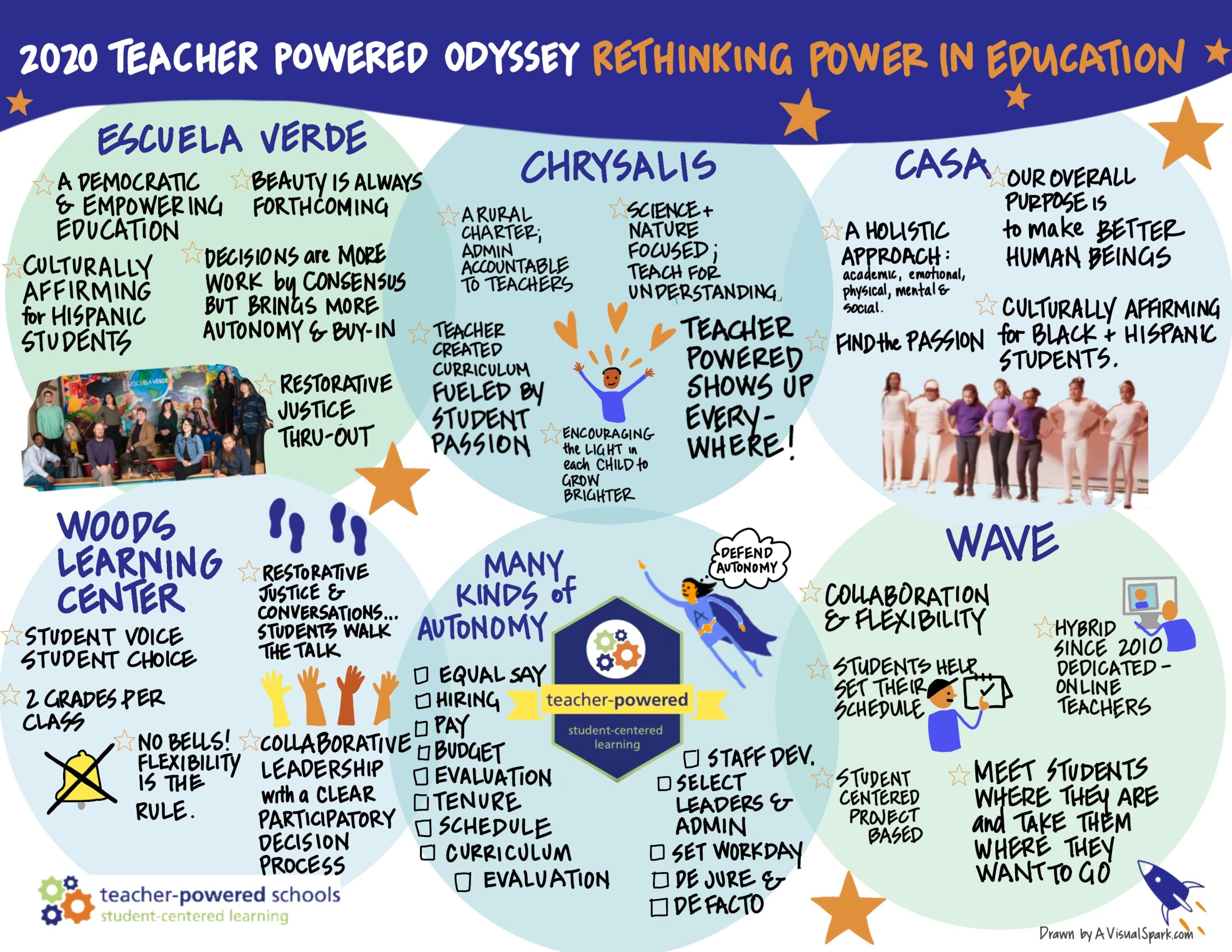
Footage collected by teachers—featuring interviews with colleagues, students, administrators, and parents—was used to create virtual video site visits to CASA in New York City; WAVE in Ypsilanti, MI; Escuela Verde in Milwaukee; EdVisions Off Campus in Minnesota; Woods Learning Center in Casper, WY; and Chrysalis Charter School in Palo Cedro, CA.
These schools embody the diverse makeup of teacher-powered schools. They exist in a wide range of environments and autonomy arrangements—with no one way to do or to be teacher-powered.
Virtual video tours provided a chance to “visit” schools in parts of the country where no teacher-powered conference has yet been held.
“So much gratitude for these professionals and their willingness to share with us,” one attendee remarked. Said another: “[We] found our soul sister school.”
Reclaiming Power
Michelle King, renowned learning instigator and love activist, closed the conference with a reflective and powerful keynote address entitled “Reclaiming Power.” In her talk, King asked conference-goers to consider a different kind of power.
King offered a vision of power synonymous not with dominion, but with ability—ability borne of relationships, trust, and vulnerability.
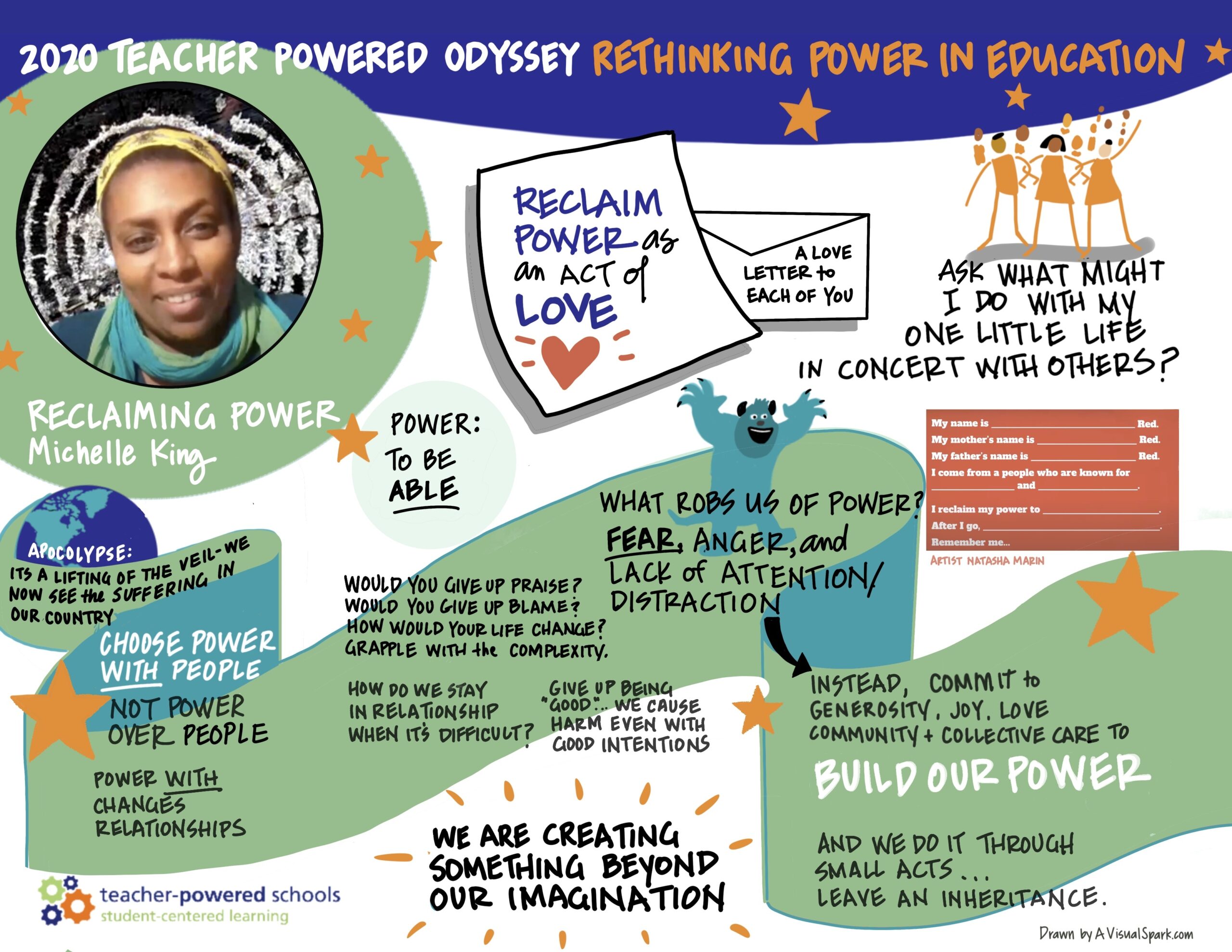
“If we look at our institutions and we look at our practices, are we only reflecting a power over?” King questioned, urging listeners to expand their ideas of what it means to be in power with. King offered a vision of power synonymous not with dominion, but with ability—ability borne of relationships, trust, and vulnerability. These are the necessary ingredients of shared power at teacher-powered schools.
This year’s event was made possible with generous support from the Bush Foundation, Labrador Foundation, and Ted Kolderie, a longtime advocate for teacher-powered schools.
We will continue to bring this community together virtually and in-person (as soon as it is safe to do so). But no matter where we are, we’re sure to keep grappling with the questions posed at this year’s conference. To keep rethinking power in education.
Found this useful? Sign up to receive Education Evolving blog posts by email.
